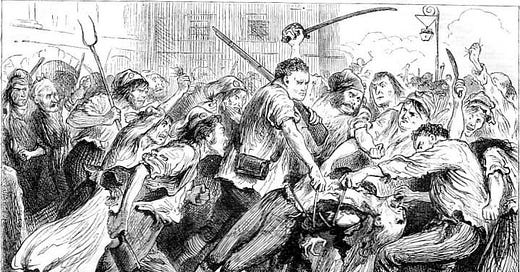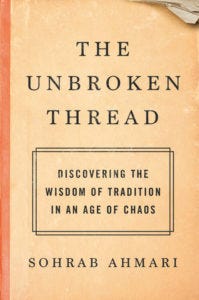Sohrab Ahmari's Straw Man Assault on Liberalism
Ahmari’s book may be facile and unconvincing, but it should still prompt defenders of liberalism to continually strengthen and sharpen their arguments
The liberal philosopher John Stuart Mill famously warned that “he who knows only his own side of the case knows little of that.” If you want to see what Mill meant by that, I submit as a practical illustration Sohrab's Ahmari’s book “The Unbroken Thread: Discovering the Wisdom of Tradition in an Age of Chaos.”
Ahmari sets out to defend not just tradition but traditionalism, as opposed to the freethinking liberal ethos that animates the modern world. Yet he does so by knocking down a series of straw men, on the theory that if he seeks out the weakest arguments and makes his opponents look bad enough, a return to tradition will seem like the only viable alternative. In the process, he renders his own side of the argument vague, facile and unconvincing.
The book is structured as a series of potted biographies of intellectuals Ahmari holds up as defenders or exemplars of traditional values. But he mostly uses them as foils for what he imagines to be the basic ideas and worldview of liberalism.
A biographical portrait of C. S. Lewis, for example, attacks the straw man of a narrow scientism, not in the ideas of an actual person, but in the ideas of a fictional villain in one of Lewis' lesser-known novels (“Out of the Silent Planet”).
Likewise, Ahmari uses Hans Jonas, a 20th century scholar of Gnosticism, as his foil against German philosopher Martin Heidegger. But how is it that Heidegger is supposed to represent the philosophical outlook of liberalism? He infamously joined the Nazi Party in 1933, then after World War II became one of the progenitors of the postmodernist school that serves as a philosophical inspiration for the contemporary illiberal left.
In a chapter on whether it is possible to have “spiritual” values and find meaning in life without traditional religious rituals, Ahmari takes as his foils a girl who works at a yoga studio and an actress who tells a reporter, “I cleanse with Dead Sea salt baths and other herbal healing baths. I love nature and herbs; they are the magic healers of the earth and connect us to the spiritual.”
I like making fun of fuzzy-headed New Age types as much as the next guy, but I also recognize that it is a very, very easy thing to do and not much of an answer to those of us who find our nonreligious spirituality, say, at the opera house instead of the yoga studio. (For that matter, it also is glibly dismissive of yoga, which is actually rooted in ancient Hindu spiritual traditions—which apparently are not among the rituals or traditions Ahmari wishes to defend.) It is easy to describe the liberal advocacy of personal autonomy as a defense of thoughtless, fleeting whims and “appetites” if these are the only examples you choose to recognize.
Liberalism and the End of the World
There is a case to be made for defending and preserving certain traditions, customs and institutions. The best argument for this is G. K. Chesterton's fence, a parable in which the great Catholic intellectual imagines encountering an old fence blocking a road. He admonishes the hasty modern reformer not to dismiss the fence as a relic and knock it down—not until he can explain why it was put there in the first place.
But Chesterton's principle was a defense of the reasonableness of traditional institutions, which implies the autonomy of the individual to weigh the evidence for and against and make his own choice. It is precisely such choice and individual autonomy that Ahmari identifies as the root of all our modern evils, arguing instead for “submission to moral and spiritual authorities” and “self-surrender, sustained by the authority of tradition and religion.”
The central chapter of the book, therefore, is the one in which he takes up the question, “Should you think for yourself?” Right off the bat, the exemplar he chooses for the modern doctrine of thinking for oneself is Timothy Leary, the apostle of hippie experimentation with hallucinogenic drugs.
There are dozens of other, far more interesting and substantive advocates of intellectual independence that he might have chosen, from John Locke or Jonathan Mayhew (an influential founding-era American preacher who championed the “right and duty of private judgment” in matters of religion) to more contemporary figures like Ayn Rand or, say, Richard Feynman. But you can see his habit of choosing the straw man, the weakest opponent—as well as pandering to a conservative audience that is likely to delight at a little rhetorical hippie-punching.
Ahmari eventually finds a heftier target in the 19th century statesman and Liberal Party leader William Gladstone, who fiercely criticized the then-new doctrine of papal infallibility. But here he finds the need to poison the well by describing Gladstone as a defender of slavery and delivering a sinister insinuation about “the London prostitutes he visited nightly, to 'rescue' them, he claimed.”
As a young man, Gladstone had resisted the abolition of slavery—while he was still a traditionalist “High Tory,” before his conversion to liberalism. As to the prostitutes, Gladstone's rescue work was a sincere effort motivated by his Evangelical Christian beliefs, and there is no evidence that he was meeting these women in their professional capacity, so to speak. You can find that out if you bother to wade into the book's endnotes; so Ahmari knows the truth. But he also knows most readers won't bother with the endnotes and so is happy to let the insinuation stand. It serves the function of discrediting Gladstone as a debauched slaver before his argument is even heard.
By the end of the chapter, Ahmari has offered no actual, specific defense of papal authority. He is hoping you won't notice because he sure did beat the heck out of that straw man.
The construction of sufficiently frightening bogeymen naturally lends itself to a penchant for catastrophism. Thus, contemplating the prospect of people following their own individual conscience, he immediately summons the prospect of “those whose 'liberty of conscience' led them to take up Satanism or child sacrifice.” As they say, that escalated quickly.
You can see the logical, or at least tactical, imperative behind this kind of argument. Rather than living in an “age of chaos,” as Ahmari's subtitle would have it, we live in an age of relative peace and prosperity. To get us to embrace a return to religious authority, the traditionalist needs to panic us into thinking that the (relatively) liberal present is a living hell. He does this mostly just by repeating his general sense of foreboding, in the hope that the reader will share his anxieties.
But in many of the cases where he makes a verifiable claim, it doesn't stand up to scrutiny. He makes several offhand references to “astronomical divorce rates,” for example, even though the divorce rate long ago leveled out and has begun a steady, gradual decline.
Similarly, Ahmari's case for the Sabbath (and for blue laws) is based on the notion that corporations are attempting to work us to death. “We have cashiered the Sabbath for algorithmic human-resources scheduling: computer code designed to minimize labor costs and maximize efficiency, regardless of the impact on families and communities.” Actual evidence indicates that we have not all been turned into cogs in the economic machine. Labor force participation has declined to a level not seen in 50 years. Average working hours are still declining, while leisure time has steadily increased—even more so in hyper-secular Europe, which really cuts against Ahmari's thesis.
But Ahmari loves to borrow from the lively leftist genre of corporate conspiracy theories. Thus, he attempts to portray thinking for yourself as some form of corporate serfdom. “Large corporations, especially, want nothing more than for our minds to be independent—that is, unmoored from absolute, unbendable moral authorities that might challenge corporate agendas.”
Freedom Is Not Slavery
You have to admit there's a certain ingenuity in using the old “Wake up, sheeple” routine as an argument in favor of authority, but this really sums up the contradiction of the whole enterprise. Ahmari is attempting to reason us into subordinating our reason; he is trying to get us to surrender our individual will of our own free choice. He is forced to acknowledge, implicitly, that we actually cannot divest ourselves of the autonomy he wants us to renounce.
This is particularly true in Ahmari's own case. He begins by describing his background as an Iranian immigrant coming from a Muslim culture with secular parents. In converting to Catholicism, he has adopted traditions that are very much not his own, ones that were chosen by him rather than for him, making his conversion yet another phase of his own personal “reinvention,” another assertion of his autonomy.
The flip side of this contradiction manifests itself in Ahmari’s weird, inverted concept of freedom. In his mind, the ability to make one's own choices is bondage; his most hyperbolic formulation has got to be, “Liberty without ends or limits traps us in its own kind of gulag.” Meanwhile, the abandonment of choice is “true freedom.” He cites Maximilian Kolbe, a Polish priest who died after volunteering to take another man's place for punishment at a Nazi concentration camp, as an example of “perfect freedom.” See if you can grasp the “freedom is slavery” logic. The absence of coercion is a “kind of gulag,” but being murdered in a concentration camp is “perfect freedom.”
Such nonsensical assertions are made possible by systematically avoiding the strongest arguments on the other side and skipping over whole centuries of detailed debate about the meaning, purpose and requirements of a free society. For example, Ahmari repeats Alexander Solzhenitsyn's complaints about the sometimes callous dishonesty of the Western media and takes that as an argument against our expansive guarantees of free speech. If only someone could have informed the Founding Fathers that the press might be dishonest!
Of course, our Founders knew this intimately, and the newspapers of their day had even lower professional standards than our own. The notion that having scurrilous partisan rags is better than having state-censored media is an argument they hashed out centuries ago. So is the wider dilemma that people who are left free to make their own choices risk falling into error or evil. This is not something Ahmari and other critics of liberalism just thought of.
But centuries of liberal thinkers have also cast a skeptical eye on whether state coercion or social conformity are remedies to this problem—or actually function, as a lot of historical evidence would suggest, to prevent such evils from ever being corrected. But Ahmari chooses not to engage with any of this intellectual tradition. This makes his argument weaker and less convincing—and also very vague.
There are whole chapters in which it is unclear exactly, concretely what he is advocating. Does he want to have an officially established state religion, and what makes him think that whatever church the state chooses would be the right one? Does he want to have censorship of the press or of social media? In a chapter titled “What's Good About Death?,” he frets about “projects ... to defer natural decrepitude and death” and to “extend the maximum and average human life expectancy,” which describes most of the science of medicine.
So, which of these efforts does he think should be banned or abandoned, and according to what criteria? The answer to all of these questions is: Who knows? He thinks something should be done, but he doesn't say quite what.
Similarly, his chapter on sex attempts to draft Andrea Dworkin, the radical feminist who famously declared that all heterosexual sex is rape, as a kind of neo-Augustinian who really ought to have found her spiritual home in the Catholic Church. I have to admit that there is a certain crude plausibility to this. Yet in criticizing the “sex-positive” feminists, is Ahmari really signing up for Dworkin's militantly sex-negative outlook? Here is what we get.
I can't view embodied sexuality as such as evil. Having said that, if the choice were between Dworkin's brand of moral seriousness about sex, on one hand, and our giddy pro-sex ideology, on the other—well, the morally serious person should choose the company of the woman who spoke unpleasant truths.
You see what the straw-man epistemology accomplishes. Ahmari doesn't have to commit to a clear and specific conclusion about sexuality; instead, he sets us up with an artificial choice between Puritanism and hedonism. This has been the character of Ahmari's anti-liberalism agenda all along: the assertion of broad claims for authority, in theory, combined with a coy vagueness about what that means in practice.
Put On Your Powdered Wig
You may object that as a classical liberal and an atheist, I am not exactly predisposed to be swayed by Ahmari's arguments. Yet I am, in fact, the target audience he set for himself. He set out to puncture what he sees as the smug complacency of a liberal doctrine that holds sway only by virtue of remaining unexamined. But all he has revealed is that he has not examined it.
That leads us to the most glaring omission of the whole book. Here and elsewhere, Ahmari mutters darkly about the “powdered wig” version of liberalism, that is, the classical liberalism of Enlightenment philosophers and the Founding Fathers. It's a bit of a misnomer because the Founders and philosophes were the generation among whom the powdered wig finally fell out of style. But the point is that he repeatedly makes clear that he regards this as the root of all our troubles.
Our version of freedom sprang from the European Enlightenment, a philosophical movement that “sought to liberate man from the dead hand of tradition,” as one historian of ideas has written. Beginning in the last Eighteenth Century, men and women inspired by Enlightenment ideas swept violently through the West, assailing every source and symbol of authority that stood in the way of the sovereign individual and his autonomous exercise of his reason and his rights.
Yet the guys in the powdered wigs always remain offstage. He never confronts them or their arguments directly. There is no chapter in which Ahmari presents a laudatory biography of Robert Filmer as a way of taking down the anarchic natural-rights philosophy of John Locke. All his attacks are aimed at later manifestations of what he claims is liberalism, which often (as with Heidegger) owe much more to the 19th century backlash against the Enlightenment. He is able to act as if liberalism is an emperor without clothes and dismiss it haughtily by means of sidestepping its most powerful advocates.
This stridency—often carried to gaudy excesses, as when he defends filial piety to the point of insisting on a child's obligations even to parents who are guilty of “horrific abuse”—is partly a consequence of his preaching to the choir, throwing out red meat to the tradcons. But the fact that he thinks he can get away with it, the fact that he regards liberalism as smug, complacent and unready to defend its core claims, is something that we should take as a warning because this is where Ahmari has a point.
The philosophical defense of liberalism today is too often superficial, poorly thought out and incapable of dealing clearly and confidently with the big questions. Too often it is today's liberals who avoid engaging with the most powerful advocates of their own cause.
Ahmari's book is a giant bet on this intellectual failure because that's the only way anybody could take it seriously. Such superficial attacks on liberalism, such relentless straw-manning, can only succeed to the extent that we are complicit in allowing ourselves to forget the actual arguments and philosophical underpinnings of liberalism.
Precisely because it is so oriented around preaching to the choir, presenting things in a way that are only likely to be convincing to those who already agree with him, I do not think Ahmari's book will be influential or long-remembered. But the rise of this new strain of intellectual opposition reminds us to increase our own engagement with Enlightenment philosophers and ideas—and with the challenges to them—and to rededicate ourselves to strengthen and extend those ideas through vigorous debate and discussion.
It is a reminder for us to put on our powdered wigs and get to work.








